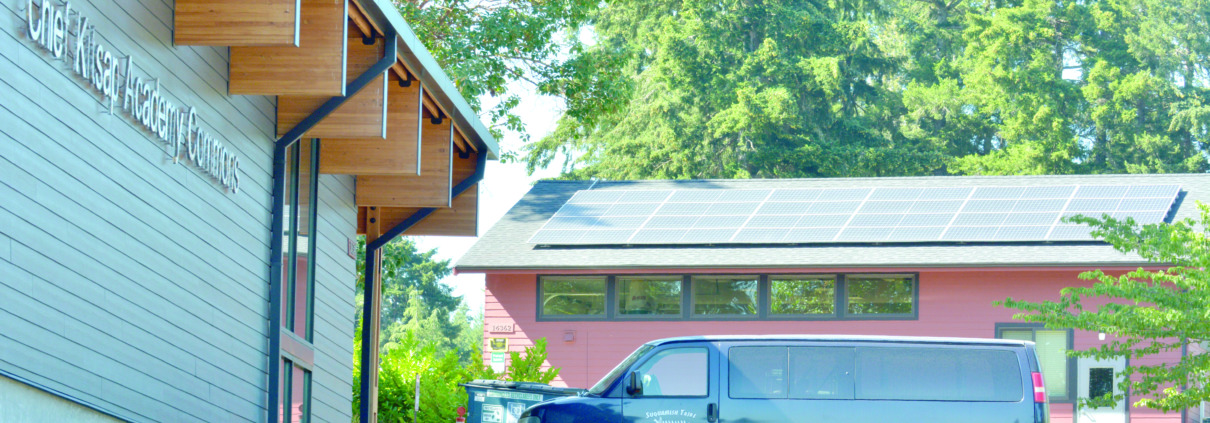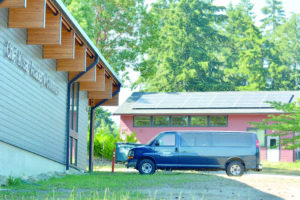Suquamish Tribe gets ready for climate change impacts
The Suquamish Tribe is launching a groundbreaking Climate Resiliency Program aimed at preparing the tribal community for the impacts of climate change while reducing the tribe’s contribution to global warming and enhancing the well-being of tribal families.
The Suquamish Tribe plans to convert some of its fleet to electric vehicles, including an EV car share program for tribal members. Solar power systems like this one at Chief Kitsap Academy will be installed on government buildings and tribal member homes.
Spearheaded by the Tribe’s Natural Resources Department under the Treaty Rights Protection Division, the program is harnessing a wellspring of federal and state grants designed to spur green energy efforts. In its first few months, the program has already secured more than $4 million in funding, and has applied for $14 million more.
“This program is about ensuring our community can bounce back from climate hazards like increased temperatures, extreme precipitation, drought, and sea level rise,” said Hannah Ljunggren, the Climate Team’s program manager, during a recent Lunchtime Forum for tribal members.
Energy-efficient heating and cooling
Among the first initiatives set to be rolled out to the tribal community are ductless heat pumps in tribal homes. The systems, also known as mini splits, offer an energy efficient way to both heat and cool homes, reducing costs for residents. Initially, the program will prioritize on-reservation tribal Elders, with plans to expand to more tribal member homes as additional grant funding is secured.
Ductless heat pumps are a game-changer for the community, said Ljunggren, who brings experience from similar programs in Olympia and Bainbridge Island. “They provide efficient heating and cooling without the need for disruptive ductwork, helping households become more resilient to extreme weather events.”
In addition to installing heat pumps at no cost, crews will also provide weatherization services to seal off gaps around windows and doors and other spaces where leaky airflow can rob efficiency. Households will be able to keep their wood burning stoves.
Solar power for sustainable energy
Another significant aspect of the program is the installation of solar systems on tribal government buildings and, eventually, on tribal member homes. This initiative aims to lower energy costs, reduce greenhouse gas emissions, and provide backup power during outages.
“We’ve already seen solar installations at the Family & Friends Center and Chief Kitsap Academy,” said Annie Smaus, a climate resilience program specialist, until recently with the tribe’s Grants Department. “These projects not only reduce our environmental impact but also ensure that our community has reliable energy sources during emergencies.”
The House of Awakened Culture and the Tribal Administration Building will likely be the next government buildings to get outfitted with solar panels and battery systems. Tribal rental homes managed by Community Development with good sun exposure will follow as funding is secured.
Transition to electric vehicles
To further reduce carbon emissions, the tribe is converting some of its government fleet to electric vehicles. A new car share program will allow tribal members to check out EVs for personal use, promoting clean transportation within the community. The team may then expand to electric bikes and scooters.
Charging stations will be installed at various locations around the reservation.
Community-driven climate action
The team’s work is rooted in community engagement. A Climate Working Group, consisting of representatives from various tribal committees and government departments, guided the creation of a Priority Climate Action Plan. This plan, which includes measures to analyze and reduce greenhouse gas emissions, provided the foundation for the funding proposals that are gaining support for these efforts.
Education and community involvement are critical to the program’s success. Jennie Harlan, the Climate Program’s education outreach specialist, is tasked with ensuring that community members are informed and engaged.
“We need your input to make this work,” said Harlan during the Lunchtime Forum. “My job is to provide you with the information you need about the tribe’s climate projects and ensure there are consistent opportunities for your feedback.”
The program will also emphasize workforce development, offering opportunities for tribal members to gain skills in installing and maintaining latest green technologies.
Looking ahead
As the program continues to evolve, the Suquamish Tribe remains committed to its long-term vision of sustainability and resilience. Future initiatives will include additional educational programs, workshops, and partnerships with local organizations to enhance the program’s reach and impact.
“Climate change can be a little scary, but with community support, it becomes an exciting opportunity to shape a sustainable future for ourselves and future generations,” said Forum host and Suquamish Tribal member Rosie Bayes. “We want our descendants to live on these lands, fish in these waters, and harvest medicinal plants from our forests. So this work is very exciting and very much needed.”
By Jon Anderson



